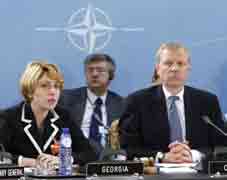Tbilisi hails NATO decision
By Temuri Kiguradze
Thursday, December 4

NATO Secretary-General Jaap de Hoop Scheffer said that the alliance has agreed to develop Annual National Programmes for Georgia and Ukraine, and added that the decision did not mean that MAP had “evaporated.” “Without prejudice to any further decisions on MAP, we will develop so-called Annual National Programmes to help them [Georgia and Ukraine] advance their reforms; in other words we are going to beef up the NATO-Ukraine Commission and NATO-Georgia Commission and maximize our assistance,” Scheffer said after the session of NATO Foreign Ministers.
“We managed to take a step forward,” Giorgi Baramidze, the Georgian State Minister for Euro-Atlantic integration issues told journalists in Tbilisi on December 3. “This is not MAP, but it is an important element that brings us closer to the alliance and enables us to implement the important process of reforms in all spheres to ensure these correspond to NATO standards.” Georgian Prime Minister Grigol Mgaloblishvili told a Government session on December 3 that the NATO decision has three components. “The first is the recognition of success in the process of reforming, the second confirmation of the key thesis of the Bucharest resolution and the third new mechanisms will be offered for achieving Georgia's membership of the alliance,'' he said in a televised speech.
The Annual National Programme that will be offered to Georgia has some details yet to be specified. Deputy Georgian Minister of Foreign Affairs Nino Kalandadze told journalists in Tbilisi on December 3 that the decision was a sign that NATO had “appreciated Georgia’s efforts towards democratic development.” Kalandadze also said that annual assessments of Georgia would be made based on the Annual National Programme, within the framework of the NATO-Georgia Commission. The details of the programme were due to be discussed on the second day of the Ministerial on December 3, when Georgian Foreign Minister Eka Tkeshelashvili was expected to deliver a speech to the various delegations.
The NATO General Secretary noted that MAP is still needed for Georgia, in contradiction of the statements of US Secretary of State Condoleezza Rica that Georgia and Ukraine may enter the alliance without fulfilling a Membership Action Plan like the Czech Republic did. “MAP has not ceased to exist. There was no decision taken on MAP by the Foreign Ministers; but you cannot say that MAP has evaporated; MAP is still there,” said Scheffer in Brussels.
Talking about the restoration of the dialogue between NATO and Russia, which strongly objects to Georgia’s aspiration to join the bloc, Scheffer noted that “allies agreed on what I would quantify as a conditional and graduated reengagement with Russia,” and also admitted the possibility of dialogue “on an informal basis.”
“This graduated reengagement certainly does not mean that we now suddenly agree with Russia on its disproportionate use of force in August in the Caucasus, the illegal recognition of Abkhazia and South Ossetia, or the fact that Russians are still taking positions that they should not take in that area… We fundamentally disagree,” Scheffer said.
